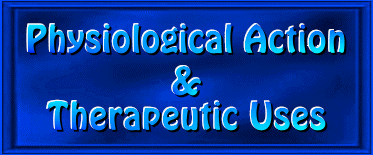


The following is excerpted from The Professional's Herbal Formula Handbook No. 19, comprising 113 pages of traditional information and recent scientific data that describes the medical properties, physiological action and therapeutic uses for each of the 24 ingredients outlined in this formula.




Adaptogenic, alterative, anabolic, anti-bilious, antibiotic, anti-cachexic, anti-diabetic, anti-dyscratic, anti-fatigue, anti-glycosuric, anti-infective, antioxidant, antiphlogistic (anti-inflammatory), anti-polyuric, antiseptic, antispasmodic, astringent, bacteriostatic (anti-bacterial), balsamic, calmative, cholagogue, choleretic, cytophylactic, cytotoxic, decongestant, deobstruent, depurative, detoxicant, diaphoretic, disinfectant, diuretic, hepatic, hyperglycemic, hyperinsulinemic, immuno-potentiating, immuno-stimulant, microbicidal (anti-microbial), nutritive, rejuvenative, systemic relaxant, restorative, sialagogue, spasmolytic, stimulant (circulatory and secretolytic), stomachic, tonic, vasodilator, vasotonic and viricidal (anti-viral).


Alleviates any general fluids dyscrasia (abnormal or pathological condition) within the blood vessels (arteries, veins or capillaries) throughout the entire circulatory system and genito-urinary tract that leads to the onset of certain degenerative or debilitative conditions associated with blood sugar disorders in the form of diabetes (including albuminurinicus, brittle, chemical, gouty, innocens, insipidus, mellitus or toxic), hyperglycemia, hyperinsulinemia (dysfunction of the normal insulin mechanism), glycosuria (excessive accumulations of glucose in the blood or urine), polyuria (excessive urine excretions of low specific gravity), or pancreatic dysfunction (especially of the islets of Langerhans) accompanied by nephrotic syndrome, acidosis, gouty diathesis, muscle cramps, dry skin conditions, toxic poisoning, emaciation (loss of physical strength) or neurophypophyseal system dysfunction (due to injury), and eliminates any form of cachexia (state of malnourishment and general debility) within the arterial, venous or capillary system associated with the onset of various forms of glycosuria (such as alimentary, digestive, emotional, hyperglycemic, nervous, pathologic, renal and toxic) or polyuria while removing any chronic fatigue, exhaustion or weakness associated with excessive accumulations of sugars and toxic waste materials throughout the bloodstream and genito-urinary tract; relieves any form of diabetes (excessive urine excretion), due to (1) nephrotic syndrome, (2) oscillation between hyperglycemia and acidosis, (3) abnormal carbohydrate tolerance in the form of hyperinsulinemia or hyperglycemia (when subjected to stress loads of glucose), (4) gouty diathesis, (5) the presence of glycosuria, (6) inadequate tubular reabsorption of water in the kidneys, (7) inability to oxidize carbohydrates in conjunction with pancreatic dysfunction (especially in the islets of Langerhans), or (8) excessive accumulations of toxins; removes any diabetes insipidus (inherited, acquired or idiopathic metabolic disorder characterized by injury to the neurophypophyseal system) associated with deficient production or release of an anti-diuretic hormone that leads to inadequate tubular reabsorption of water in the kidneys, thereby producing copious amounts of urine (of low specific gravity) and extreme thirst accompanied by voracious appetite, loss of strength and emaciation; alleviates any diabetes mellitus (metabolic disorder characterized by the inability to oxidize carbohydrates) associated with pancreatic dysfunction (especially in the islets of Langerhans) and subsequent imbalance of the normal insulin mechanism, thereby producing hyperglycemia (along with glycosuria and polyuria) accompanied by excessive thirst, extreme hunger, emaciation, weakness, weight loss, dry skin conditions, poor healing capabilities, and impaired combustion of fats (lipids) that leads to acidosis, dyspnea (difficult breathing conditions), lipemia, and occasionally pruritis and lowered resistance to pyrogenic infections; eliminates any form of glycosuria (the presence or excretion of abnormally large amounts of sugar [glucose] in the urine), due to (1) the ingestion of processed sugar, (2) violent emotional responses, (3) hyperglycemia, (4) high concentrations of magnesium in the blood, (5) stimulation of the great splanchnic nerve, (6) inherited inability of the renal tubules to completely reabsorb glucose, or (7) excessive accumulations of toxic poisons; alleviates any pancreatic disorders, and reduces any insulin dependency; relieves any chronic blood stasis (diminution of the flow of blood or other bodily fluids) throughout the spleen and portal system, and balances the chemical composition of the blood; removes any atonic conditions throughout the digestive system, and eases any muscle cramps associated with diabetes by stimulating normal fibrillar contractibility and increased tonicity throughout the musculature; exhibits antispasmodic, balsamic, calmative, hypotensive, relaxant and spasmolytic effects in order to relax the smooth muscles throughout the entire organism (especially the digestive system), thereby removing any spasmodic contractions or muscle cramps associated with diabetes; inhibits the development of superfluous muscular tissue or abnormal growth patterns within the musculature, and promotes increased muscular tonicity throughout the walls of the stomach and intestines; strengthens the muscular tissues, and displays secretolytic stimulatory effects (due to the presence of the alkaloid berberine) in order to increase the production and secretion of bile and bilirubin; eliminates any biliousness, and relieves any duodenal catarrh aggravated by biliary concretions; displays cholagogue and choleretic activity in order to remove any liver stasis (stagnation), and relieves any atonic conditions in the biliary channels or liver deficiencies (hepato-biliary insufficiency) associated with diabetes by promoting increased drainage; dispels any stagnant or excessive accumulations of bile, and stimulates the flow of bile directly into the duodenum; exhibits significant choleretic and cholagogue properties in order to remove any putrefaction or septicemia in the bloodstream, which ultimately leads to the development of autointoxication (auto-toxemia) throughout the entire circulatory system and genito-urinary tract; displays astringent properties (due to the presence of tannins) in order to strengthen the functional capabilities of the spleen (which is responsible for filtering the blood and releasing compounds that potentiate immune function), thereby maintaining proper blood supplies within the arteries, blood vessels and capillaries throughout the entire circulatory system; exhibits cytophylactic and cytotoxic activity in order to provide stronger cellular defense mechanisms against many physical or chemical agents, and displays anti-infective and disinfectant properties in order to promote increased resistance by destroying any invasive or harmful pathogenic bacteria, microbes or viruses that are often responsible for various infectious states or inflammatory conditions; exhibits bacteriostatic, microbicidal and viricidal activity in order to strengthen and increase the resistance in the bloodstream against any invasive or harmful bacteria or microbes, as well as to inhibit the further development of any infectious or inflammatory conditions associated with the onset of diabetes or hyperglycemia; removes any general debility or exhaustion accompanied by global or localized dryness (particularly in the mouth or skin tissues associated with diabetes or hyperglycemia), which is usually caused by various internal inflammatory conditions; demonstrates significant antiphlogistic effects in order to inhibit the formation of certain inflammatory compounds (such as histamine, leukotrienes, prostaglandin, serine proteases and thromboxanes), as well as to reduce any severe inflammatory swelling associated with any degenerative conditions by exerting an extremely positive influence towards correcting any internal inflammatory conditions throughout the bloodstream and genito-urinary tract; exhibits significant antiseptic activity by destroying the vitality of any organized living ferments in order to prevent the onset of putrefaction or septicemia, and precipitates the proteins in any inflamed tissues in order to provide a mildly antiseptic and protective coating (under which the regeneration of new tissue occurs) for the mucous membranes and tissue-systems throughout the entire circulatory system; acts as an effective antiseptic in order to remove any septic conditions associated with tissue degeneration or ulceration, and promotes increased suppuration and a steady toning or restorative impression to the entire glandular system (especially the liver, spleen and lymph glands); exhibits anabolic activity in order to accelerate the production of DNA and RNA (which enhances the production of proteins in the form of antibodies), while increasing protein and lipid synthesis in the bone marrow and DNA/RNA content in the adrenals and lymph nodes (along with increased body weight and enhanced re-synthesis of glycogen and high-energy phosphate compounds); demonstrates powerful adaptogenic (balancing and strengthening) activity in order to increase the overall resistance of an organism towards any adverse influences or stressful conditions (whether they be physical, chemical or biological), especially throughout the immune system, bloodstream, musculature, and both the central (cerebro-spinal centers) and peripheral nervous systems; exhibits immuno-potentiating and immuno-stimulatory effects in order to enhance greater long-term immune potential and overall systemic immunity (or immune cell activity) and increased immune response (by activating the body's natural defense mechanisms), particularly in relation to the removal or restoration of any degenerative conditions throughout the bloodstream or genito-urinary tract; demonstrates sialagogue activity in order to promote increased salivary flows, particularly during dry mouth conditions associated with diabetes; displays stomachic properties in order to increase the production of gastric and pancreatic juices, which are necessary for the proper digestion of sugars and various other essential nutrients; acts as a secretolytic stimulant in order to promote increased gastric, pancreatic or intestinal secretory and motor activity, and enhances greater peripheral circulation (due to its antioxidant activity); exhibits significant antioxidant effects in order to provide greater oxygen-transport capabilities throughout the bloodstream and genito-urinary tract, as well as enhance the transport of additional oxygen directly into the cells and tissue-systems throughout the blood vessels (arteries, veins and capillaries); acts as a circulatory stimulant by increasing the blood flows throughout the circulatory system in order to enhance greater nutrient transport, absorption and utilization, thereby accelerating the healing processes associated with the repair of any nutritional deficiencies or insufficiency throughout the entire organism; acts as an effective nutritive and rejuvenative tonic to the bloodstream and genito-urinary tract during convalescence (due to the presence of rich sources of carbohydrates, chromium, cobalt, fats, iron, magnesium, manganese, niacin, protein, selenium, silicon, zinc and vitamins B1, B2 and C) in order to enrich, nourish and replenish any nutritional deficiencies or insufficiency throughout the circulatory system, which leads to the development of various degenerative or debilitative conditions associated with diabetes or hyperglycemia (such as excessive thirst, extreme hunger, emaciation, weakness, weight loss, dry skin conditions, muscle cramps, toxic poisoning, poor healing capabilities, and impaired combustion of fats [lipids] that leads to acidosis); demonstrates significant rejuvenative and restorative properties upon the basic plasma tissue-systems throughout the entire organism, thereby enhancing the production of vital bodily fluids while providing greater enrichment through increased assimilation of the various organic mineral salts; accelerates the recuperative processes that are essential in order to overcome any chronic degenerative or debilitative diseases or illnesses, while facilitating greater recovery response during convalescence in order to fully regain optimal health and well-being; strengthens the unstriped muscle fibers in the arteries and other tubular muscular structures, and increases the tonicity of those muscle fibers in the terminal blood vessels; stimulates and tonifies the entire digestive system by promoting increased gastric, intestinal, pancreatic and salivary secretions; stimulates the entire glandular system by promoting greater functional capabilities throughout the liver, pancreas and spleen; removes any protoplasmic poisons or lymphatic congestion caused by excessive accumulations of toxic waste materials, as well as any general debility or exhaustion associated with extreme toxemia (chronic systemal toxicity); activates the bodily processes of detoxification and elimination in order to cleanse and purify the bloodstream and tissue-systems, and increases both sensible and insensible perspiration in order to more effectively enhance the eliminative capabilities of the body; acts as an eliminative vasotonic to the blood, liver and splenic functions, as well as upon the eliminative functions of the lymphatic system; enhances the overall cleansing process by dilating the surface capillaries in order to more effectively remove any toxic debris or metabolic waste materials through the pores of the skin, and increases the secretion and elimination of urine in order to provide further support to the inner cleansing process; displays alterative activity in order to correct any disordered bodily function, thereby activating increased alterations in both metabolic and tissue functions as a defensive measure against the onset of acute or chronic disease; exhibits restorative effects in order to regain increased vigor or vitality and greater strength, while enhancing normal tissue and metabolic functional capabilities; demonstrates alterative and restorative properties in order to re-establish healthy systemic functional capabilities, as well as to establish greater vascular tone throughout the entire organism (due to its ability to stimulate increased secretory flows); exhibits alterative effects in order to stimulate the anabolic growth processes, thereby enhancing the repair of any degenerated, deteriorated and debilitated cells or tissues (while promoting the elimination of any catabolic waste materials); displays tonifying effects in order to permanently enhance the overall energy-levels throughout the entire organism, without adversely affecting the functional capabilities of any particular organ or system.
![]()
None.
![]()